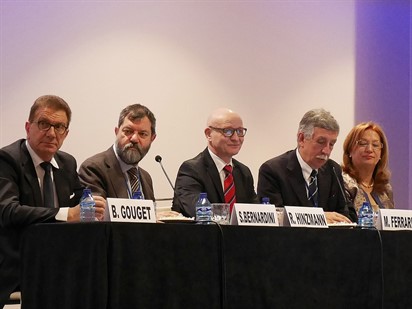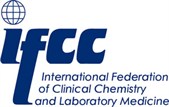.
The Madrid IFCC General Conference at a Glance
by Dr Bernard GOUGET, Chair IFCC General Conference
Chair, IFCC Nominations Committee, Counsellor Public Health FHF
On 19-21 March 2016, the IFCC organized the XII. General Conference in Madrid, Spain, under the slogan "Feeding the future of IFCC now!". We were grateful to welcome 273 leaders from across labs and academia plus 59 accompanying attendees, providing the opportunity of reviewing the operational, scientific, and strategic management of the Federation in a collaborative and foresighted manner. We were joined this year by a large international community of scientists coming from 71 national societies, as well as students and young scientists and by 14 representatives from the industry. It was one of the biggest General Conferences in terms of number of participants.
A survey was conducted, in collaboration with the IFCC office, to help the Federation gain understanding of the scientific and educational needs and aspirations of the full members and partners, and to provide feedback on accumulated experience. We received 138 responses (out of a total 273) from the national representatives, chairs and members of functional units, corporate members, guests and speakers. 40% of respondents said that they participated for the first time at this IFCC-GC. The overall satisfaction rate was over 95%. We would like to say once again how grateful we are for the Greek speaker who gave an excellent lecture on Mediterranean diet, he helped us to digest the food!
In addition to the board session, the event featured 18 plenary conferences, 12 training seminars, 3 round tables, numerous breakout discussions and networking opportunities covering various aspects of the IFCC strategic plan, and the progress and outcomes achieved by the IFCC functional units led by the divisions and the executive board.
After the opening, the IFCC-EB Secretary chaired the EB session on the IFCC strategic plan and outlook for IFCC in the years ahead in terms of the financial situation. The IFCC President reported on the outcome of the SWOT analysis. He emphasized the need to provide strategies for improving the crucial role of Lab Medicine in patient care, and the importance of quality and use of the IFCC's unique expertise in standardization. He stressed the fact that IFCC's future increasingly depends on the activity of the regional federations. The presidents of the six regional federations participating in the round-table were convinced of the value of the dialogue with the IFCC toward reinforcing collaboration and encouraging efficient communications. This is the reason why the regional presidents will be seated at the EB beginning with 2018.

The IFCC President also wants to increase collaboration with other international organizations, clinical societies, and international stakeholders in healthcare, while inviting more young scientists to participate in the committees and WGs. The IFCC Treasurer recalled that in recent years, our scientific and educational activities have increased significantly, leading to a growth in related expenditures, while on the other hand the income of the IFCC has not kept pace. Financial difficulties are anticipated in 2016 due to the fact that no major conferences will be held during the year. In addition, improved results need to be achieved with the IFCC portfolio at the LGT bank, pursuant to the recent low performance. It was decided to lower our portfolio's risk exposure and develop protective measures against possible financial fluctuations.
The CM-EB Representative highlighted the evolution of the IVD industry's ongoing support in accordance with new regulations and ethics codes -- changes that are bound to impact IFCC and the current business model of conducting conferences. The new Code of Ethical Business Practice, developed by MedTech Europe, that sets mandatory rules for the interaction of the IVD industry vis a vis healthcare professionals and organizations, becomes effective in January 2018 with regard to the sponsorship of conferences. Win-win partnerships have to be set up toward building an integrated continuum of services and collaborations. The future hybrid conference model presented during the CCC session raised a great deal of concern with regard to IFCC congresses, despite a potential of providing opportunities for increased interaction and revenues.
During the three-day conference, the level of satisfaction with the plenary sessions (>96%) and interactive sessions (>79%) was very well balanced to allow for personal interaction during the breaks. The time devoted to questions and discussions was also satisfactory. Each division received a half-day session to discuss the hot topics and research programs chosen by the chairs. Clinical Effectiveness, Quality, Standardization and Harmonization Procedures were particularly appreciated, as well as the e-Academy Project, Distance Learning Programs and the Ethics Session. The choice of topics attracted the interest of the participants and most of the sessions were informative and excellent.
Thank you again to the speakers for having agreed to repeat their talk three times for the interactive sessions. There is always a need to develop more "group discussions" and breakout brainstorming workshops to be conducted, and the results reported back to the GC audience for further deliberation. A large number of proposals and ideas have been submitted for the next General Conference, including: improving clinical lab performance through standardization and traceability, quality management and accreditation. Also valuable insight was gained on major technological advances and new tools -- selective robotics, nano/biosensors, POCT, genomics and other “omics”, precision medicine, oncology, microbiology, mobile health, ethics, big data, etc.
The good news was the lack of criticism about travel and access to the venue. Clearly, choosing a venue next to a major international airport was a wise decision. Many cities from respondents to the survey were suggested for the venue of the next GC, mainly in Europe or in North and South America, or in the African or Asian Pacific regions. The current EB has a challenge in determining where and when to hold the next meeting. The EB has also to select someone to provide the leadership for the next GC.
Among the most beneficial aspects of the General Conference, networking and knowledge gain were reported as key elements. More than 98% of the attendees consider this conference as an important and valuable event. The conference provided an inclusive environment and great opportunities for a better understanding of the structure and functioning of the IFCC, with the opportunity to meet face to face, to strengthen relations with the IFCC-EB members, the IFCC staff and colleagues, and getting an up-to-date and comprehensive picture of the IFCC.
Feedback has been very positive on both the organization and the scientific content: very high level, quite the optimum. However, more visibility of the national representatives, more interaction with young scientists, more attention to developing countries, more discussion on the future of the profession, must be adequately addressed in the context of the evolution of Laboratory Medicine.
It was a great pleasure to chair the XII. General Conference with the valuable support of the IFCC office. The 2016 GC provided a unique opportunity to immerse the IFCC community in a variety of managerial, scientific and educational experiences and to demonstrate that Laboratory Medicine is at the forefront of a fundamental transformation in healthcare. Thank you again for your encouraging comments. We truly valued your active participation and profound commitment to a strong and sustainable IFCC future!
